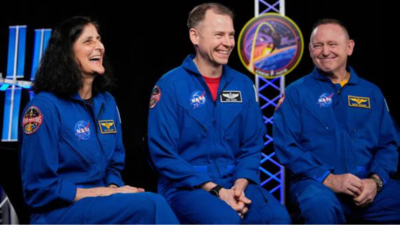Nasa astronauts Barry “Butch” Wilmore and Sunita Williams have dismissed claims that they were “stuck” or “abandoned” in space, reports the Guardian.
Speaking at a press conference in Houston on Monday, their first since returning to Earth two weeks ago on March 18, Wilmore and Williams claimed that they were never in distress and had adapted to their extended mission.
The astronauts, originally scheduled for a 10-day mission, spent an unexpected nine months aboard the International Space Station (ISS) but insist they never felt stranded.
‘Planning for one thing, preparing for another’
The two astronauts, who had travelled to the ISS last June aboard Boeing’s Starliner spacecraft, found themselves staying far longer than intended due to technical issues with the capsule. However, instead of seeing it as an ordeal, they approached it as part of their job.
“We were planning for one thing, preparing for another,” Wilmore said during the press conference, explaining that they transitioned from being test pilots for the new spacecraft to fully integrated ISS crew members.
Rejecting the ‘stuck’ narrative
Williams and Wilmore gave diplomatic answers to questions about the “stuck and marooned” narrative.
In an earlier interview with Fox News, they rejected the “abandoned” narrative.
“The stuck and marooned narrative … yes, we heard about that,” Wilmore acknowledged before stressing that their situation was never dire. “In certain respects, we were stuck, in certain respects, maybe we were stranded, but based on how they were couching this—that we were left and forgotten in orbit—we were nowhere near any of that at all.”
“The plan went way off for what we had planned. But because we’re in human spaceflight, we prepare for any number of contingencies. This is a curvy road. You never know where it’s going to go,” he continued.
He clarified that while they did not return home as originally planned, they were never in danger. “Stuck? OK, we didn’t get to come home the way we planned. But in the big scheme of things, we weren’t stuck.”
‘You do your job’
Williams reinforced Wilmore’s claim that while in orbit, their priority was simply carrying out their work.
“You sort of get maybe a little bit tunnel-visioned … you do your job type of thing, right, and so you’re not really aware of what else is going on down there,” she said.
“I hate to say that maybe the world doesn’t revolve around us, but we revolve around the world, something like that,” she added.
Crew 9 commander speaks out
The third astronaut at the press conference, Nick Hague, who commanded Crew 9 and returned to Earth with Wilmore and Williams, also dismissed the “abandoned” narrative.
“The politics, kind of, they don’t make it up there when we’re trying to make operational decisions,” he said. “As the commander, [I’m] responsible for the safety of this crew and getting them back safely.”
The future of Starliner
Boeing’s Starliner programme is now uncertain as Nasa and Boeing engineers investigate helium leaks and thruster issues that stopped Wilmore and Williams from returning on it.
Despite these challenges, both astronauts expressed confidence in Starliner’s potential and said they would fly on it again.
Mission commander Wilmore reflected on the experience and what could have been done differently. “There were questions I wish I’d asked during the flight that might have brought a different outcome,” he said, acknowledging some gaps in testing and preparation.
However, he rejected the idea of assigning blame. “Could you point fingers? I don’t want to point fingers. I hope nobody wants to point fingers. We don’t want to look back and say, ‘shame, shame, shame’. We want to look forward and say, ‘Let’s make the future even more productive and better’.”
Nasa and Boeing are set to discuss their findings in a meeting with the astronauts later this week.




